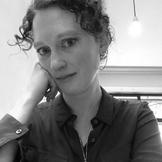Dr. Elizabeth M. Bonapfel

Freie Universitaet Berlin
Global Humanities Junior Research and Teaching Stay at Harvard University
Elizabeth M. Bonapfel is a German Research Foundation (DFG) Research Associate at the Peter Szondi Institute of Comparative Literature, Freie Universität Berlin. Her current research project traces the evolution of punctuation in modern English literature. She received her Ph.D. in English and American Literature from New York University with a certificate in Poetics and Theory in 2014. She is co-editor of Doubtful Points: Joyce and Punctuation (2014), in which her article “Marking Realism in Dubliners” appears. Other work has appeared or will appear in Theatre Survey, the Dublin James Joyce Journal, the James Joyce Quarterly, and Joyce Studies in Italy. She received her B.A. in English Literature from Haverford College.
Teaching Slot within the Summer School 2018:
Tracking Diachronic Changes in Punctuation in English Literature:
An Inquiry into the Causality of Cultural Change
This session will explore the notion of causality and cultural change through the lens of the historical evolution of punctuation in modern English literature. Even as clearly-identifiable punctuation patterns emerge over time, it is often difficult to pinpoint the exact nature and cause of these changes. Even as certain aspects of punctuation change, others remain consistent, thus contributing to subtle shifts in marking strategies. Methodologically, the session will draw on the notion of the text as a material artefact in order to explore what changes in punctuation over time can tell us about perceptions of and approaches to cultural causality.
Punctuating Presences: How Punctuation "Marks" Voice
What would literature look like without punctuation? Elizabeth M. Bonapfel’s current research project, Punctuating Presences: How Punctuation ‘Marks’ Voice, traces the evolution of punctuation in modern English literature by exploring how current punctuation practices (dashes, ellipses, parentheses, among others) derive largely from the novel’s tendency to borrow from 17th- and 18th-century printed dramatic texts, which attempted to translate the impression of spoken speech from the stage to the page. With a focus on historical conventions as they have solidified and changed from the late 17th century to the present, the project thus explores what punctuation usage tells us about the interrelationship among genres and how punctuation signals transitions in various “voices” (character, narrator, speaker, actor) in a textual medium.
